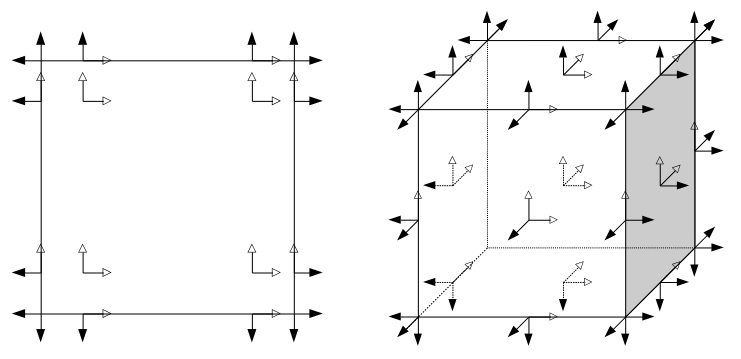 |
Reference documentation for deal.II version 9.0.0
|
 |
Reference documentation for deal.II version 9.0.0
|
#include <deal.II/base/polynomials_rt_bubbles.h>
Public Member Functions | |
| PolynomialsRT_Bubbles (const unsigned int k) | |
| void | compute (const Point< dim > &unit_point, std::vector< Tensor< 1, dim > > &values, std::vector< Tensor< 2, dim > > &grads, std::vector< Tensor< 3, dim > > &grad_grads, std::vector< Tensor< 4, dim > > &third_derivatives, std::vector< Tensor< 5, dim > > &fourth_derivatives) const |
| unsigned int | n () const |
| unsigned int | degree () const |
| std::string | name () const |
Static Public Member Functions | |
| static unsigned int | compute_n_pols (const unsigned int degree) |
Private Attributes | |
| const unsigned int | my_degree |
| const PolynomialsRaviartThomas< dim > | raviart_thomas_space |
| std::vector< Polynomials::Polynomial< double > > | monomials |
| unsigned int | n_pols |
This class implements the Hdiv-conforming, vector-valued enhanced Raviart-Thomas polynomials.
Similarly to the classical Raviart-Thomas space, the enhanced Raviart-Thomas polynomials are constructed such that the divergence is in the tensor product polynomial space Qk-1.
This space is of the form Vk = RTk-1 + Bk, where Bk is defined as follows:
\begin{align*} B_k^1(E) = \text{span}\left\{x^{a_1-1} y^{a_2}\begin{pmatrix} (a_2+1) x \\ -a_1 y \end{pmatrix}\text{ : } a_2=k \right\} \\ B_k^2(E) = \text{span}\left\{x^{b_1} y^{b_2-1}\begin{pmatrix} -b_2 x \\ (b_1+1) y \end{pmatrix}\text{ : } b_1=k \right\} \end{align*}
\begin{align*} B_k^1(E) = \text{span}\left\{x^{a_1-1} y^{a_2} z^{a_3}\begin{pmatrix} (a_2+a_3+2) x \\ -a_1 y \\ -a_1 z \end{pmatrix}\text{ : } a_2=k \text{ or } a_3=k \right\},\\ B_k^2(E) = \text{span}\left\{x^{b_1} y^{b_2-1} z^{b_3}\begin{pmatrix} -b_2 x \\ (b_1+b_3+2) y \\ -b_2 z \end{pmatrix}\text{ : } b_1=k \text{ or } b_3=k \right\},\\ B_k^3(E) = \text{span}\left\{x^{c_1}y^{c_2}z^{c_3-1}\begin{pmatrix} -c_3 x \\ -c_3y \\ (c_1+c_2+2)z \end{pmatrix}\text{ : } c_1=k \text{ or } c_2=k \right\}, \end{align*}
where 0 \le a_1, a_2, a_3 \le k.
The total dimension of the space dim(Vk) = d*(k+1)^d, where d is the space dimension. This allows to associate shape functions with the Gauss-Lobatto quadrature points as shown in the figures below.

|
| Left - 2D,\,k=3, right - 3D,\,k=2. |
Definition at line 83 of file polynomials_rt_bubbles.h.
| PolynomialsRT_Bubbles< dim >::PolynomialsRT_Bubbles | ( | const unsigned int | k | ) |
Constructor. Creates all basis functions for RT_bubbles polynomials of given degree.
Definition at line 27 of file polynomials_rt_bubbles.cc.
| void PolynomialsRT_Bubbles< dim >::compute | ( | const Point< dim > & | unit_point, |
| std::vector< Tensor< 1, dim > > & | values, | ||
| std::vector< Tensor< 2, dim > > & | grads, | ||
| std::vector< Tensor< 3, dim > > & | grad_grads, | ||
| std::vector< Tensor< 4, dim > > & | third_derivatives, | ||
| std::vector< Tensor< 5, dim > > & | fourth_derivatives | ||
| ) | const |
Computes the value and the first and second derivatives of each RT_bubbles polynomial at unit_point.
The size of the vectors must either be zero or equal n(). In the first case, the function will not compute these values.
If you need values or derivatives of all tensor product polynomials then use this function, rather than using any of the compute_value, compute_grad or compute_grad_grad functions, see below, in a loop over all tensor product polynomials.
Definition at line 44 of file polynomials_rt_bubbles.cc.
|
inline |
Returns the number of enhanced Raviart-Thomas polynomials.
Definition at line 161 of file polynomials_rt_bubbles.h.
|
inline |
Returns the degree of the RT_bubble space, which is one less than the highest polynomial degree.
Definition at line 170 of file polynomials_rt_bubbles.h.
|
inline |
Return the name of the space, which is RT_Bubbles.
Definition at line 179 of file polynomials_rt_bubbles.h.
|
static |
Return the number of polynomials in the space RT_Bubbles(degree) without requiring to build an object of PolynomialsRT-Bubbles. This is required by the FiniteElement classes.
Definition at line 493 of file polynomials_rt_bubbles.cc.
|
private |
The degree of this object as given to the constructor.
Definition at line 138 of file polynomials_rt_bubbles.h.
|
private |
An object representing the Raviart-Thomas part of the space
Definition at line 143 of file polynomials_rt_bubbles.h.
|
private |
Storage for monomials, we need all polynomials from degree zero to k+1.
Definition at line 149 of file polynomials_rt_bubbles.h.
|
private |
Number of RT_Bubbles polynomials.
Definition at line 154 of file polynomials_rt_bubbles.h.
 1.8.14
1.8.14